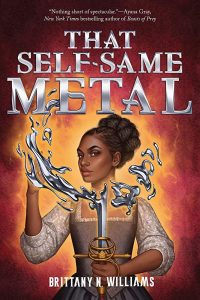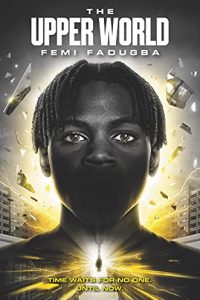Alex Brown Reviews That Self-Same Metal by Brittany N. Williams
 That Self-Same Metal, Brittany N. Williams (Amulet Books 978-1-41975-864-5, $19.99. 352pp, hc) April 2023.
That Self-Same Metal, Brittany N. Williams (Amulet Books 978-1-41975-864-5, $19.99. 352pp, hc) April 2023.
I finished That Self-Same Metal, book 1 of Brittany N. Williams’ Forge and Fracture Saga, about 15 minutes before writing this and I’m already desperate for the sequel. That I have to wait a whole year for it is a crime, plain and simple.
Set in London in 1605 at the beginning of the reign of King James I (yes, the dude who commissioned that version of the Bible with all the thee’s and hath’s) – this new young adult historical fantasy follows the lives of twins Joan and James Sands. Joan is Williams’s creation but James is based on a real person, James Sands or Saunders, as Williams explains at the back of the book. Much of the novel follows that trend, blending historical fact with fantastical fiction. Williams takes it one step further by making sure readers know just how diverse the past was in terms of race, gender, and sexual and romantic identities. All of the major and many of the minor characters are queer and/or Black, even the ones you might not expect. Polyamory comes up not once but twice, and no one bats an eye either time. I’ve often said that if I ever had the chance to go back in time I would refuse, but if the past was anything like what Williams has imagined it as, I would travel there in a heartbeat. Someone call The Doctor!
Sorry, got distracted by my own adoration. Back to the summary. Joan and James both work for the King’s Men, the acting company we know mostly because William Shakespeare wrote for and performed with them. James is an actor, while Joan, who cannot legally appear on stage because she’s a woman, is content to choreograph stage fights. What no one else knows is that she and James can channel the powers of the Orisha. James has the magic of wind, thanks to Oya, while Joan can manipulate and create metal, thanks to Ogun. Everything falls apart when Baba Ben, a Black elder in her community and the only other living child of Ogun, is arrested by King James. This act shatters the precarious and ancient pact that kept the most dangerous Fae out of the human world. Violence flows into London like a tide, and Joan is the only one powerful enough to stop it.
This is no lone wolf YA fantasy, though. Joan is not left all alone to fight her battles. Throughout the novel, her parents, her brother, her friends, and her potential lovers all gather around her. She is the tip of the spear, and the people who care for her are all holding her up. Auberon, the self-styled king of the fairies, declares war on Joan, and she fights some of the most frightening creatures the fae have to offer as others terrorize the town. The fae seem to be everywhere all at once; some are allies, some are foes, and some change depending on how the wind blows. Also nipping at her heels is a heartless lord, a white man who sees Joan as little more than a draft animal to do his bidding. Getting out from his yoke – and not having it replaced by a gilded yoke held by fairy queen Titanea – might be just as impossible as stopping the fairy king from killing her.
As I mentioned, Williams runs real history through the fantasy wringer with this series. Guy Fawkes even makes an appearance, as does his attempt at blowing up Parliament, but the way Williams twists it into the fantastical is wild. She’s not afraid to explore anti-Blackness, either. Joan deals frequently deals with racism and misogynoir, but Williams always keeps the story centered on her, allowing her to experience it without it becoming about the perpetrator or Joan having to ‘‘overcome’’ it. Joan understands the system, how to navigate and survive it while always holding true to yourself. We really only see queerness in the context of Joan’s community, and everyone is refreshingly cool about it. Queerness isn’t the default, but it’s so normalized for Joan and her people that when it pops up, it’s treated no differently than if someone were cisallohet. If you, like me, don’t care for love triangles and always wish they just let everyone be polyam, well, my little lambkins, just you wait.
I also adored the way Williams folded in folk traditions around the Orisha. An author’s note emphasizes that the depictions herein are as fictionalized, as the other historical figures in the book, that they’re based on real beliefs but are not in and of themselves accurate representations. Sometimes the magic effects come off as a little silly, and I still don’t have a firm grasp on how the magic system works or what its limits are, but who cares, because the story is so much fun and the characters are so entertaining. The plot moves quickly and builds to a twist I didn’t see coming.
Vividly expressive, riotously queer, beautifully Black, and wildly creative, That Self-Same Metal was a pleasure to read. I have been begging the publishing industry for a book like this for years, and Brittany N. Williams did not disappoint. If this is what she can do as a debut, there’s no stopping her. Get ready or get out of the way.
Alex Brown is a librarian, author, historian, and Hugo-nominated and Ignyte award-winning critic who writes about speculative fiction, young adult fiction, librarianship, and Black history.
This review and more like it in the April 2023 issue of Locus.
 While you are here, please take a moment to support Locus with a one-time or recurring donation. We rely on reader donations to keep the magazine and site going, and would like to keep the site paywall free, but WE NEED YOUR FINANCIAL SUPPORT to continue quality coverage of the science fiction and fantasy field.
While you are here, please take a moment to support Locus with a one-time or recurring donation. We rely on reader donations to keep the magazine and site going, and would like to keep the site paywall free, but WE NEED YOUR FINANCIAL SUPPORT to continue quality coverage of the science fiction and fantasy field.
©Locus Magazine. Copyrighted material may not be republished without permission of LSFF.







